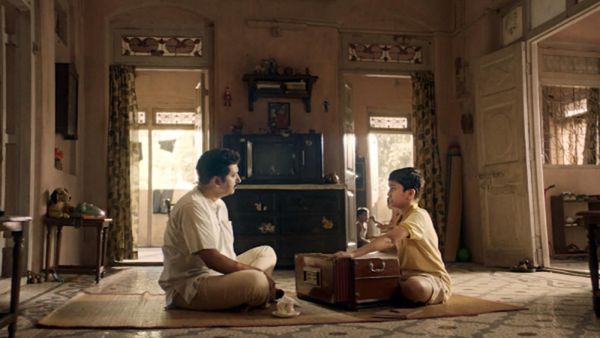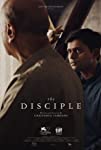Eye For Film >> Movies >> The Disciple (2020) Film Review
The Disciple
Reviewed by: Anne-Katrin Titze

In his novel Tomorrow In The Battle Think On Me, Javier Marías writes about the transformation of our most precious belongings into trash, when “everything that had meaning and history loses it in a single moment and my belongings lie there inert, suddenly incapable of revealing their past and their origins; and someone will make a pile of them.”
The Disciple, winner of Best Screenplay at the Venice Film Festival and a Main Slate selection for the New York Film Festival is director/screenwriter Chaitanya Tamhane’s exquisite second feature, after his début Court won the Venice Horizons Award for Best Film in 2014. Executive produced by Alfonso Cuarón (director of Children Of Men and the multiple BAFTA/Oscar winners ROMA and Gravity) and Rakesh Mehra, The Disciple is about meaning and history, loss and grace, legacy and discipline.
It is also a film about North-Indian classical music called Khayal, and the fine differences between the truthfulness and art of its performers. If you are clueless about this form of music, it places you in a fine position and state of mind, as feeling palpably inadequate is a leitmotif for the film’s hero, Sharad Nerulkar (Aditya Modak), a Khayal singer whom we first meet in 2006. He is in his early twenties, performing with his master or Guruji, Maestro Vinayak Pradhan (Dr. Arun Dravid), practising alone at night, and buying pale-peach kurta-pyjamas in a fabric store to wear at a competition. Not too fancy, not too plain, “simple” is what this Goldilocks wants and he quotes his father as saying, in English, that once you are on stage “everything is part of the performance.”
Sharad’s father (Kiran Yadnyopavit), who shows up in beautifully framed childhood flashbacks, swathed in golden light (cinematography by Michal Sobocinski) teaching his son about music, was himself a failed performer, so we hear, whose self-delusions kept him from greatness in this art form that lives and dies through the vocalists’ truthfulness and honesty in the moment. Both his father and present teacher were disciples of the great Maai, legendary guru and high priestess of the genre, an ascetic whose own performances never were recorded and whose philosophy, secretly taped, guides Sharad’s life.
The transferred audio reel-to-reel recordings, including crackling, from 1979 of Maai’s voice (Sumitra Bhave), hold sway over the film’s rhythm, as Sharad listens to her teachings whenever he rides his motorcycle through the orange-tinted streets of Mumbai at night. We never see Maai’s face, nor do we see his mother, who is talked about often. The deliberate physical absence of major players in the plot is not the only aspect that connects Tamhane’s film with the work of Yasujiro Ozu. There is also the way many of the interior shots are framed and the overall outer calm which is slowly and deliberately exposing inner turmoil.
We are given time, which is wonderful, to count and study the painted ceiling fans and observe the hand-movements of the attentive music listeners. “We are shown a path to the divine” Maai says of the eternal quest. With each interlude on the back of Sharad’s motorbike, we get a lesson about what we are listening to so that we can pay attention. “A restless mind cannot sing Khayal music with depth and authenticity” we learn, and that “your mind has to be pure and unblemished.” The state of mind of the singer in the moment is all important and any greed and falsehood can be felt. Is Tamhane, who is also The Disciple’s disciplined editor, speaking of the dangers in filmmaking?
Images of what selling out to greed and falsehood looks like enter this picture in various scenes and accumulate in the career of a young singer who is discovered in an appalling TV talent contest, that Sharad follows with fascination and dismay. The provincial girl with the great voice is turned into what Maai would surely call a “circus monkey” in a sparkly purple ballgown, and ultimately sings with black lips and a scaley-looking bodysuit as though she were swallowed whole by the glittering boa constrictor of corporate entertainment. A rise to stardom means a fall from grace into garbageland.
During one of his nightly rides, Maai’s recorded voice speaks of Saraswati, the Goddess of Music, and the importance of perseverance. All is calm. The screen gradually goes to black and we are catapulted into a time closer to the present, circa 2018. Sharad is older, at a photoshoot for his new website. He teaches, still rides his motorbike, still listens too Maai. The world has shifted into more superfluous ugliness. He is used to comments from his guruji, who scolds him for not singing with an open throat (during a performance in front of the audience!), for embellishing too much at times and at others being “too bland” and “scattered”. Online comments posted underneath a video showing him perform, also calling out his blandness, fall into a different category altogether, that of a world of random, anonymous, bored cruelty that has nothing to do with anything meaningful anymore.
Tamhane has a wonderfully light touch with self-exposure. Sharad, besides practising to become a classical singer, works for his friend Kishore (Makarand Mukund), selling traditional music by unknown performers that they have converted to CDs which fewer and fewer people are interested in checking out. One evening, Kishore arranges a meeting with the influential music writer and collector Rajan Joshi (Prasad Vanarse), a big, bearded man who knows a lot about his subject. The awe about the American’s knowledge visibly turns into something else when Joshi, without being asked, unpacks his gossip, sparing none of our Sharad’s idols. “Everybody steals from my house”, he says, and so and so was a prostitute and so and so crazy and self-righteous. The glee with which the critic tears people down has a strong effect not only on our hero. The dynamic of protect and destroy is at the core of the movie.
To return to the quote from Javier Marias that I started with, means to look at a pivotal scene. Sharad, having once again heard that his father was Maai’s “most incompetent”, if most eager, student, decides to donate the precious tapes to a “centre”, a kind of library. The secretary, a young woman putting the information into the computer has never heard of the great Maestra, whose voice we have been listening to since the start of the film. She has no idea how precious the content of the cardboard box is for us. With horror we learn that this is the only copy and, a perfect touch - the young ignorant woman behind the desk calls an older woman to carry the box away. To be stored, if accepted, archived, never to be heard of again? It takes effort and caring to keep the treasures of the past alive.
The Disciple’s wonderful last note takes place in motion with a musical tall tale, where fishes sprout from trees and deer hold a wedding - the perfect link to centuries of storytelling.
Reviewed on: 14 Sep 2020














